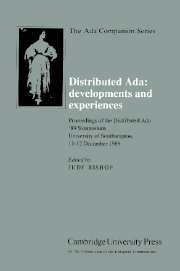 Distributed Ada: Developments and Experiences
Distributed Ada: Developments and Experiences Book contents
- Frontmatter
- Contents
- Preface
- Distributed Ada – the Issues
- Distributed Ada – a Case Study
- Parallel Ada for Symmetrical Multiprocessors
- The York Distributed Ada Project
- From DIADEM to DRAGOON
- Honeywell Distributed Ada – Approach
- Honeywell Distributed Ada – Implementation
- Ada for Tightly Coupled Systems
- A Pragmatic Approach to Distributed Ada for Transputers
- Distributed Ada on Shared Memory Multiprocessors
- The MUMS Multiprocessor Ada Project
- A Portable Common Executable Environment for Ada
- Supporting Reliable Distributed Systems in Ada 9X
A Pragmatic Approach to Distributed Ada for Transputers
Published online by Cambridge University Press: 13 October 2009
- Frontmatter
- Contents
- Preface
- Distributed Ada – the Issues
- Distributed Ada – a Case Study
- Parallel Ada for Symmetrical Multiprocessors
- The York Distributed Ada Project
- From DIADEM to DRAGOON
- Honeywell Distributed Ada – Approach
- Honeywell Distributed Ada – Implementation
- Ada for Tightly Coupled Systems
- A Pragmatic Approach to Distributed Ada for Transputers
- Distributed Ada on Shared Memory Multiprocessors
- The MUMS Multiprocessor Ada Project
- A Portable Common Executable Environment for Ada
- Supporting Reliable Distributed Systems in Ada 9X
Summary
ABSTRACT
This paper describes firstly a general model for implementing Ada in a distributed or parallel system using existing compilation systems and without extensions to, or restrictions on, the Ada language definition. It then describes an instance of the model, namely how to implement an application across a network of transputers in Ada using the current Alsys Ada Compilation System for the Transputer.
INTRODUCTION
Much debate has already taken place regarding the inadequacies of Ada to support a single program running on a distributed or parallel architecture. This has led to a set of twelve requirements from the Parallel/Distributed Systems Working Group for consideration by the Ada 9X Project Requirements Team [DoD89]. Whilst we await Ada 9X, it is very important to be able to demonstrate that current Ada can be used to program distributed systems efficiently, without compromising Ada's goals of security and portability. This document describes how Ada can be used in this way in the general case and also gives an example of distributed Ada on the Inmos transputer. The transputer has been chosen primarily as a precursor to a study commissioned by the European Space Agency into the problems of, and recommendations for, mapping Ada onto a multi-transputer network for on-board space applications.
The intention of the general model is to be able to demonstrate support for the needs of distributed systems such as:
program partitioning and configuration;
dynamic reconfiguration and fault tolerance;
different perception of time in different partitions;
different scheduling requirements in different…
- Type
- Chapter
- Information
- Distributed Ada: Developments and ExperiencesProceedings of the Distributed Ada '89 Symposium, University of Southampton, 11–12 December 1989, pp. 200 - 221Publisher: Cambridge University PressPrint publication year: 1990
- 2
- Cited by


